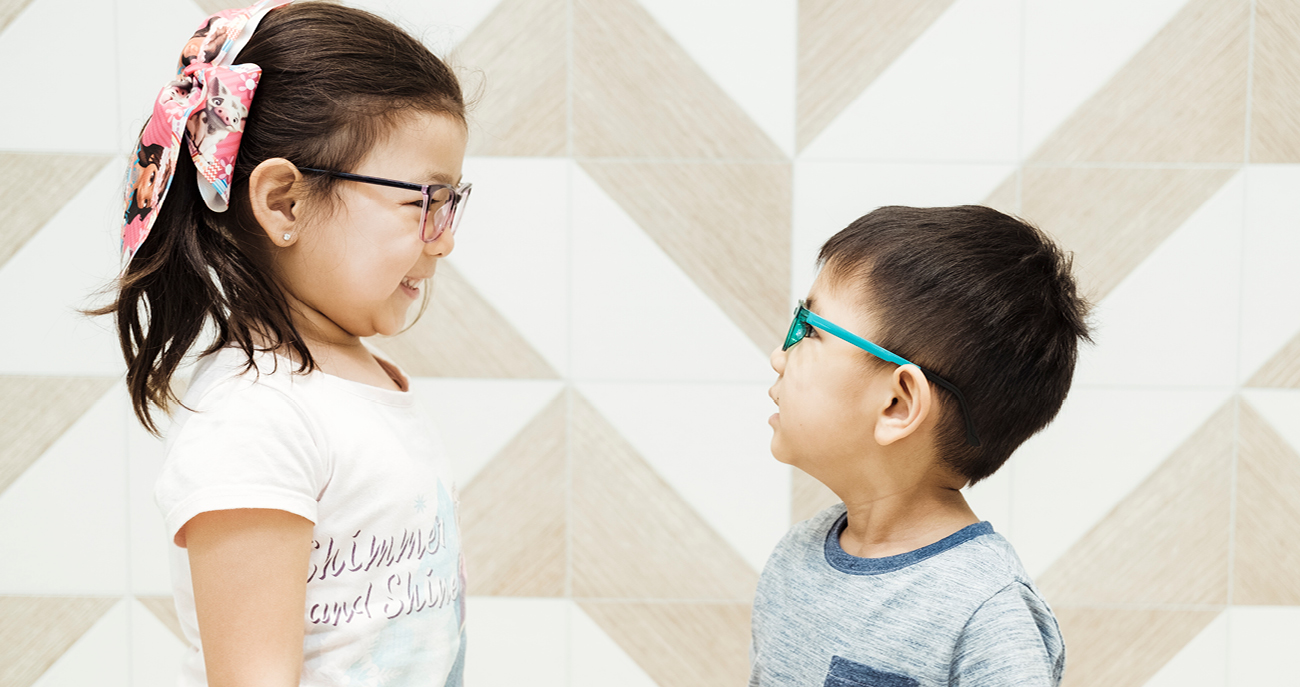7 Common Eye Problems in Children
Eye care services play a significant role in maintaining children's vision health. Optometrists can help detect and diagnose eye conditions, eye diseases, vision problems and give advice on how to maintain good eye health for you and your children. They can also prescribe prescription glasses, contact lenses or orthokeratology lenses to correct your child's vision and improve their quality of life.
Early detection and treatments can prevent long-term damage to a child's eyes. Eye care services can identify issues such as lazy eyes, crossed eyes, nearsightedness, and farsightedness. These significantly impact a child's vision and ability to learn, play and interact with the world around them.
Kid's Common Eye Problems
Parents should know the most common paediatric eye problems that could affect their children's vision for early diagnosis and to minimise potential damage.
Nearsightedness (Myopia)
Nearsightedness is one of the refractive errors that happens when images are focused in front of the retina instead of directly on it. Nearsightedness or short-sightedness results in blurry distant vision, while near vision remains normal. Symptoms include difficulty seeing distant objects, eyestrain and frequent squinting.
Farsightedness (Hyperopia)
Farsightedness, or hyperopia, occurs when light is focused behind the retina. It results in blurry near vision and clear distant vision. Common symptoms of this eye problem include eyestrain and headaches after reading for long periods. Additionally, some children may experience double vision and difficulty focusing on close-up objects.
Astigmatism
Astigmatism is one of the refractive errors that occurs the eye is unable to focus light evenly onto the retina. As a result, blurred vision may occur at all distances. Symptoms of astigmatism include headaches, eyestrain and difficulty seeing at night.
Amblyopia (Lazy Eye)
Amblyopia, or lazy eye, is a vision condition in which the brain fails to recognise images seen by one eye. Amblyopia occurs when the two eyes have different levels of refractive errors (i.e. one eye is more nearsighted than the other). Symptoms of lazy eye can include poor depth perception and reduced visual acuity in one eye.
Strabismus (Crossed Eyes)
Strabismus, also known as crossed eyes, is a condition in which the two eyes are not aligned correctly. It can cause double vision and reduced depth perception. Common signs of strabismus include one eye turning inward or outward and misaligned eyes when looking at near objects.
Colour Vision Deficiency
Colour vision deficiency, or colour blindness, is a condition in which an individual cannot perceive certain colours. It is usually due to the absence of specific cone cells in the retina. Common symptoms include difficulty distinguishing between certain shades of colour and seeing contrast.
Conjunctivitis (Pink Eye)
Conjunctivitis, known as pink eye, is an infection of the conjunctiva that causes eye redness and irritation. Common symptoms include itching, burning sensation, eye discharge, and light sensitivity.
Signs of Eye Problems in Child
Holding reading materials or electronic devices too close to the face
Covering an eye while reading or watching TV
Squinting, blinking excessively, or having trouble focusing while doing visual tasks
Headaches, especially after reading or using electronic devices for an extended period
Difficulty seeing objects at a distance or up close
Double vision or blurry vision
Inability to recognise familiar faces
Abnormal eye movement or jiggling of the eyes (nystagmus)
Droopy eyelid
Importance of Early Detection and Treatment
Early intervention can help prevent vision loss and even blindness. If issues are caught early enough, treatments may be simpler, more effective, and less costly. In addition, treatment for vision problems can also improve the child's academic outcomes, self-esteem, and quality of life.
Promoting Healthy Vision in Children
Maintaining optimal eye health is crucial for children's overall well-being and development. Here are some tips and practices that can promote healthy vision in children:
Regular Eye Examinations
It is important to bring your children to the kid's optometrist for a regular comprehensive eye exam. This eye exam can detect subtle vision problems that may not be obvious during a visual acuity test at school or home. Early detection of any potential vision issues enables timely intervention and possible corrective treatments.
Proper Nutrition for Eye Health
Eating nutritious foods that contain essential vitamins and minerals can promote healthy vision development in children. It includes leafy green vegetables, fatty fish like salmon and tuna, eggs, citrus fruits, nuts and seeds, carrots, sweet potatoes and other brightly coloured fruits and vegetables.
Eye Safety and Protective Eyewear
In certain activities, such as sports, it is highly recommended for children to wear protective eyewear to prevent injuries. Eye Concept's eyewear range for kids are designed with safety and comfort in mind and provides superior protection against impact hazards. We offer optical lenses that are made from scratch-resistant polycarbonate material, which blocks 99% of harmful UV rays, preventing potential vision problems from overexposure to sunlight. We also stock a range of kid's frames are lightweight and comfortable, making it an ideal choice for your little ones!
Limiting Screen Time and Digital Eye Strain
Children should be encouraged to limit their screen time and take regular breaks from the digital devices. Proper lighting while using screens is also important as it reduces eye fatigue and prevents dry eyes. Ensure your child's computer monitor and other device screens are placed at a distance to avoid straining the eyes.
When to Seek Professional Eye Care
Parents should consult an optometrists if they notice any signs in their children: frequent headaches, squinting, difficulty focusing on objects close or far away, excessive tearing or sensitivity to light. Early intervention can help prevent vision problems from worsening, prevent permanent vision loss and protect your child's overall health.


